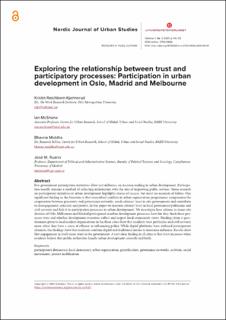| dc.contributor.author | Reichborn-Kjennerud, Kristin | |
| dc.contributor.author | McShane, Ian | |
| dc.contributor.author | Middha, Bhavna | |
| dc.contributor.author | Ruano, Jose | |
| dc.date.accessioned | 2022-03-31T09:04:26Z | |
| dc.date.available | 2022-03-31T09:04:26Z | |
| dc.date.created | 2022-03-30T14:57:25Z | |
| dc.date.issued | 2021 | |
| dc.identifier.citation | Nordic Journal of Urban Studies. 2021, 1 (2), 94-112. | en_US |
| dc.identifier.issn | 2703-8866 | |
| dc.identifier.uri | https://hdl.handle.net/11250/2988765 | |
| dc.description.abstract | Few government participation initiatives allow real influence on decision making in urban development. Participation mostly remains a method of collecting information with the aim of improving public services. Some research on participatory initiatives in urban development highlights stories of success, but most are accounts of failure. One significant finding in the literature is that unresolved conflicts in urban regeneration programmes compromise the cooperation between grassroots and governance networks, erode citizensʼ trust in city governments and contribute to disengagement, cynicism and protest. In this paper we measure citizensʼ trust in local government politicians and civil servants and link it to participation processes in urban development. We investigate how citizens in inner-city districts of Oslo, Melbourne and Madrid participated in urban development processes, how fair they think these processes were and whether development outcomes reflect and respect local community views. Findings from a questionnaire given to local resident organisations in the three cities show that residents trust politicians and civil servants more when they have a sense of efficacy in influencing policy. While digital platforms have widened participatory channels, the findings show that residents combine digital and traditional modes to maximise influence. Results show that engagement in itself raises trust in the government. A very clear finding in all cities is that trust increases when residents believe that public authorities handle urban development correctly and fairly. | en_US |
| dc.language.iso | eng | en_US |
| dc.publisher | Universitetsforlaget | en_US |
| dc.rights | Navngivelse-Ikkekommersiell 4.0 Internasjonal | * |
| dc.rights.uri | http://creativecommons.org/licenses/by-nc/4.0/deed.no | * |
| dc.subject | Participatory democracy | en_US |
| dc.subject | Urban regeneration | en_US |
| dc.subject | Gentrification | en_US |
| dc.subject | Governance networks | en_US |
| dc.subject | Activism | en_US |
| dc.title | Exploring the relationship between trust and participatory processes: Participation in urban development in Oslo, Madrid and Melbourne | en_US |
| dc.type | Journal article | en_US |
| dc.description.version | publishedVersion | en_US |
| cristin.ispublished | true | |
| cristin.fulltext | original | |
| dc.identifier.doi | 10.18261/issn.2703-8866-2021-02-01 | |
| dc.identifier.cristin | 2013762 | |
| dc.source.journal | Nordic Journal of Urban Studies | en_US |
| dc.source.volume | 1 | en_US |
| dc.source.issue | 2 | en_US |
| dc.source.pagenumber | 94-112 | en_US |
| dc.relation.project | Norges forskningsråd: 281131 | en_US |
| dc.subject.nsi | VDP::Samfunnsvitenskap: 200::Urbanisme og fysisk planlegging: 230 | en_US |

